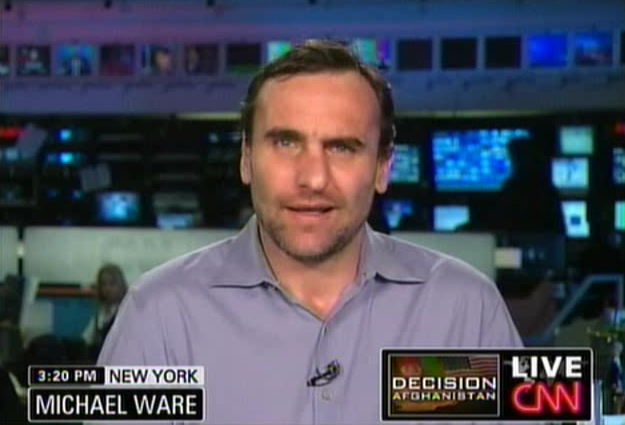NR: "Pakistan and India see each other as mortal enemies. And Afghanistan is just one more field in which those two are fighting."
Tuesday, December 01, 2009

Length: 4:14
LARGE (49.5 MB) ----- SMALL (5.2 MB)
Rick Sanchez talks to Michael prior to the president's speech and asks him what we will actually be able to achieve in Afghanistan.
RICK SANCHEZ: All right, Michael Ware is joining us now.
Michael, thanks so much for being with us.
I'm just wondering here, as I'm looking at this speech the president's going to give tonight, what are we going to be able to do in three years that we haven't been able to do in eight years?
MICHAEL WARE, CNN CORRESPONDENT: Well, it depends what you do, Rick, with what you have got.
Now, the U.S. mission in Afghanistan has never had enough forces to actually do the job. And by sending 30,000-odd extra troops or so, that will help.
SANCHEZ: What's the job? What is the job?
WARE: That's a great question. That's a great question, Rick.
The job is not to defeat and destroy the Taliban, because I have got to tell you, mate, you can't do that. The Taliban are fighting on their home soil. It's their own villages, their own valleys, the same goat tracks they used to defeat the Soviets. So, what we're hoping to do is actually, for once in eight years, put the hurt on the Taliban. The Taliban war machine is ticking over untouched -- recruiting, supplying, deploying, attacking. We have not been able to put a dent in that. You've got to put a dent in that, put some military pressure on the Taliban, where they're going to feel some pain.
SANCHEZ: To what end? Yes, to what end? Is it a win when we're done with that?
WARE: To the end of parlaying something into a political solution.
Rick, no matter what America wants to do, no matter what America thinks it can do, you're not going to get out of Afghanistan by -- and preserve American national interests without cutting some kind of political deal with the Afghan government, with the Taliban, with the Pakistani government, with the Indian government.
SANCHEZ: Is that about giving people money over there again, like we were giving hundreds of thousands...
WARE: It's way beyond money. It's way beyond money. Money is certainly going to be a part of it.
But you have got the Afghan government sitting there in Kabul with its tens of thousands of troops and police. It's got no power in the villages. So, you're going to have to find friends, the tribal leaders, the old warlords, to create the kinds of militias that we saw work in Iraq because the American soldiers, Afghan soldiers, they're not enough. Then you've got to get India and Pakistan to back off.
SANCHEZ: I'm glad you mentioned Iraq. I trust your sense of this as much as I trust anyone's, because I know you have been there. You have been in the funny costumes, hiding out amongst the people and really getting to know how this whole thing works.
So, here is the question to you. Given what you have learned so far about what the president will say today, is this doable? Do you believe, given your experience -- put on your analyst hat for me for just a moment, not necessarily your correspondent hat -- do you see it as feasible, workable?
WARE: With a couple of miracles and a sprinkle of luck, it's theoretically possible.
One of the key things, though, that we're going to have to see addressed that probably won't be touched upon this evening, although who knows, is that the truth is, Rick, American troops are bleeding and dying in many ways, not because of the Taliban, not because of al Qaeda, but because of Pakistan's rivalry with India.
Pakistan and India see each other as mortal enemies. And Afghanistan is just one more field in which those two are fighting.
SANCHEZ: Wow.
WARE: India long supported the rebels against the Taliban, now supports the Afghan government. Pakistan supports the Taliban. Well, until those two pull their heads in, the forces that are killing Americans on the battlefield will have the oxygen they need, Rick.
SANCHEZ: As Yogi Berra would say, it's curiouser and curiouser. [Actually, that was Lewis Carroll...]
My thanks to you, Michael Ware, for telling it straight, man. Appreciate it.
